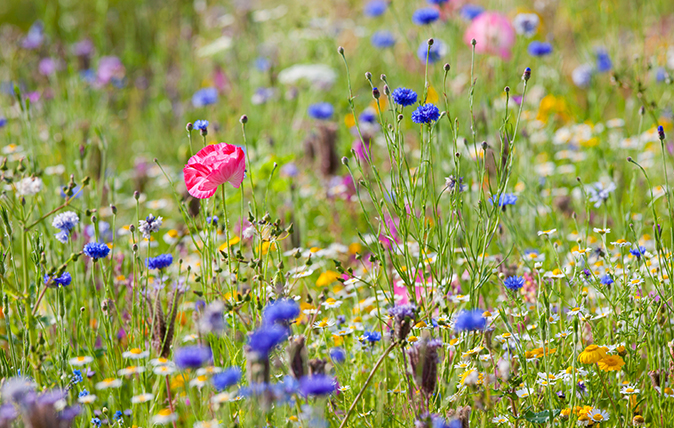Alan Titchmarsh tells a wonderful tale and issues a plea to all of us that could beautify our environment and bring people together.
Much is made, in garden design, of the value of ‘a borrowed landscape’, the utilisation of a view over terrain that is adjacent but not owned.
Little is ever mentioned, however, about ‘a shared landscape’, a fact that was brought home to me recently by the owners of a small cottage in our village, who, at the turn of the year, tore out their front hedge.
The hedge itself wasn’t remarkable. It was of the golden form of Leyland cypress and, although many dismiss that species as a greedy thug that robs neighbours of light and soil of nutrients, the hedge had always been close trimmed to a height of about 7ft, thus keeping it neat and offering privacy without in any way impinging on the free flow of traffic in the lane outside.
When the hedge was torn out last winter, I assumed it was due to the fact that the bottom 2ft, as is so often the case with conifer hedges, had become brown and bare – the result of regular visitations by dogs and the application of salt in winter to keep the tarmac ice-free. I waited for it to be replaced by a 6ft-high interwoven fence, that curse of country lanes, or else by another barricade of coniferous foliage.
I waited in vain.
“By June, all became clear… he’d created a knee-high sea of wonder.”
Passing by the cottage garden each day (it’s about 15 yards wide and perhaps six yards from kerb to doorstep), I watched as the miscellaneous plants were cleared out and the site raked smooth, aside from its narrow path.
For several weeks, the grey earth remained bare until, in late winter, three fastigiate beech trees – each about 3ft high – were planted in a loose row along the front. Not much privacy there, I thought, the new fence will clearly follow.
It didn’t and, week after week, the earth remained bare, although the owner could occasionally be glimpsed, leaning in the archway of his front door and surveying the barren earth as if waiting for something to happen.
Finally, it did. In spring, the ground sprouted a rash of seedlings. I smiled to myself and waited for the owner to wield a Dutch hoe and skim off the interlopers – but he did no such thing. Instead he waited and watched, as did I from the comfort of my car, every time I passed.
By June, all became clear. The earth erupted into a meadow of annual wildflowers that caused every passing car to slow down and marvel at the tapestry unfolding.
“I’ll have to pluck up the courage to knock on the owner’s front door.”
Here was a mixture of those species that have become rarities since the advent of improved grain-cleaning methods: scarlet annual poppies, bright-yellow corn marigolds, azure cornflowers, toadflaxes of pink and yellow, deep-blue viper’s bugloss, chamomile, corncockle and other wildlings that have created a knee-high sea of wonder.
The spirits of all who come up the lane are lifted at the sight of these British native flowers that are nowadays so unjustly neglected. The fact that the owner of the cottage possesses the generosity of spirit to allow all passers-by to see and enjoy the display deserves considerable praise, for gardens are made to be shared – not just as a part of the NGS, but also in unofficial ways that can bind town and village communities together.

My wife has decided that, next year, she would like the two borders that flank the path running up to our greenhouse to be sown with the same mixture, so I’ll have to pluck up the courage to knock on the owner’s front door and ask for the mix’s name.
There will be cultivational issues to address as well, of course. The plants will have to be allowed to seed before all the foliage is cut right down in autumn and the surface of the ground cultivated with either a hoe or a rotavator, for annual meadows require this soil disturbance if they’re not to fizzle out and regress to a patch of weedy grass populated by nothing more than buttercups, daisies and plantains.
However, the challenge is one I shall relish and I shall never forget the summer of the mini.ature wildflower meadow that made our village smile.
- My Secret Garden by Alan Titchmarsh is published by BBC Books

A simple guide to the wildflowers of Britain
At long last Spring seems to be here — and with it, the natural flora that give so much pleasure.

Alan Titchmarsh: The poetic pleasure of plant names
Our gardening expert on the days spent learning the names of some of the most obscure plants in Britain.

Alan Titchmarsh: Why Kirstenbosch is the gardener’s garden
Alan Titchmarsh waxes lyrical about one of the world's truly magnificent gardens.

Alan Titchmarsh: Why I wish I’d planted Cedars of Lebanon when I was in my 20s
The gardener writes about one of his regrets with regard to his favourite type of tree.

Alan Titchmarsh: How to keep a perfect pond
Alan Titchmarsh says that now is the time to clear out the weeds and keep your pond in top condition

Alan Titchmarsh: Don’t stop gardening in winter – start dreaming
Alan Titchmarsh takes a look at the joys and pains of gardening in the winter





